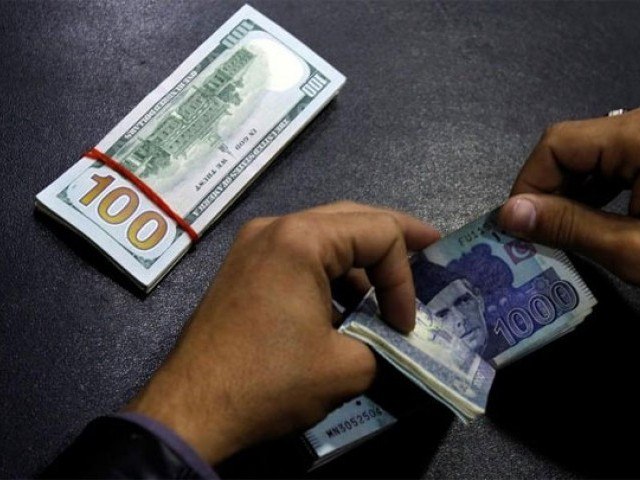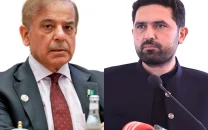Further rupee fall, interest rate hike expected
Research house sees 13-17% depreciation and 1.25-percentage-point rise in rate

PHOTO: REUTERS
In a paper on “Pakistan’s Economy: IMF Programme and its Implications”, Topline Research said the government was expected to let the rupee depreciate 13-17% to Rs160-165 against the US dollar by December 2019 and the key interest rate may be raised by 1.25 percentage points to the peak of 12% during the year.
Earlier, the central bank had let the currency depreciate by 34% to Rs141.3 to the greenback and increased the interest rate by five percentage points to 10.75% since December 2017.
The measures are feared to slow down economic activities as reflected in contraction of the large-scale manufacturing sector and lower agricultural production, where additional impact came from poor water management.
Rupee strengthens against dollar
Previously, the State Bank of Pakistan (SBP) and several international and local institutions estimated Pakistan’s gross domestic product (GDP) growth in the range of 2.5-3.5% in FY19 compared to a decade high growth of 5.2% in FY18.
The implementation of IMF programme may further worsen economic activities from the earlier forecast. “We may see major steps towards fiscal, monetary and structural reforms in the next few weeks either with or before the budget that is expected to be announced in the next few weeks. These may include rupee depreciation/free float, further hike in interest rate, increase in energy prices, elimination of subsidies, new and more taxes, aggressive privatisation among others,” the research house stated.
“Once again the IMF will demand the rupee’s free-float and we expect the rupee to settle in the range of Rs160-165 by December 2019,” it said.
Ten-month tax revenues show a shortfall of around Rs345 billion (0.9% of GDP) while the “budget deficit is expected to exceed 7% of GDP in FY19 after a gap of five years”, it added. Given the increased taxation measures to shore up revenues, reduction in subsidies and rupee depreciation, “we expect inflation to average in low double digits in FY20; we expect the central bank’s policy rate to peak at 12% during 2019”, according to the research house.
PSX outlook remains gloomy ahead of tough IMF programme
The IMF programme is expected to include key technical benchmarks including Net Domestic Assets (NDA) and Net International Reserves (NIR) targets, which will reduce borrowing from the central bank and increase forex reserves, respectively.
The government will have to pay more attention to privatising and restructuring loss-making state-owned enterprises. Moreover, the energy-sector reform and resolution of the outstanding circular debt will also likely be part of the IMF programme.
IMF expected to lend $10b
“Although the previous finance minister expected a $6-8 billion IMF package, we think the size of the programme should be bigger (over $10 billion), considering the upcoming debt repayments,” the research house stated.
With IMF’s support, other lending agencies will also feel comfortable in providing funding to Pakistan. There are news reports that the World Bank and the Asian Development Bank (ADB) will extend their support to Pakistan to the tune of $6-8 billion once Pakistan enters the IMF programme.
Pakistan got a sigh of relief after around $8.5 billion came from Saudi Arabia, the United Arab Emirates (UAE) and China. Due to these, Pakistan’s foreign exchange reserves rose from a low of $7.2 billion in December 2018 to $10.2 billion last month (April 5, 2019).
However, these have been on the decline for the last four weeks and are now down to $8.8 billion (less than two months of import cover). Foreign exchange reserves net of swaps are at low levels at $1-1.5 billion, considering $1 billion a month in upcoming debt repayment.
IMF programme by June
“Given the current discussions with the IMF team and recent changes in key government positions, we are of the view that Pakistan will likely enter the IMF programme by June,” it said.
Topline Research said it expected the IMF programme to be approved this month or next month. It estimated the bailout package to be an Extended Fund Facility (EFF) for a period of three years.
Stocks to rally post-IMF programme
Pakistan has a long history of signing IMF programmes. Following the last three IMF programmes, the benchmark KSE-100 index rallied on an average 37% in the 12 months post-IMF deal.
“We attribute the improvement in market sentiment during the IMF programme to an improved external account situation on receipt of foreign flows and stabilisation on the macroeconomic front,” it said.
“Now, based on the assumption that Pakistan will get a new IMF loan soon, we are maintaining our index target range of 40,000-45,000, providing total return of 12-26% from here.” As expected, the newly appointed adviser to the prime minister on finance is forming his own team. Over the last few days, the government has appointed a new central bank governor, Reza Baqir, who has worked with the IMF for the last 18 years and was last heading the IMF mission in Egypt.
Baqir has overseen implementation of the current IMF programme in Egypt, which was approved in November 2016 and will end later in 2019. “The Egyptian programme has two key contours - free float of currency and reduction in energy subsidy,” it said.
The government has also recently appointed Shabbar Zaidi, a seasoned tax consultant and former partner of AF Ferguson and Co, as head of other key institution, the Federal Board of Revenue (FBR). “These two changes, we believe, are a desperate move to get the IMF package and implement tough economic reforms,” the research house added.
Published in The Express Tribune, May 9th, 2019.
Like Business on Facebook, follow @TribuneBiz on Twitter to stay informed and join in the conversation.



















COMMENTS
Comments are moderated and generally will be posted if they are on-topic and not abusive.
For more information, please see our Comments FAQ